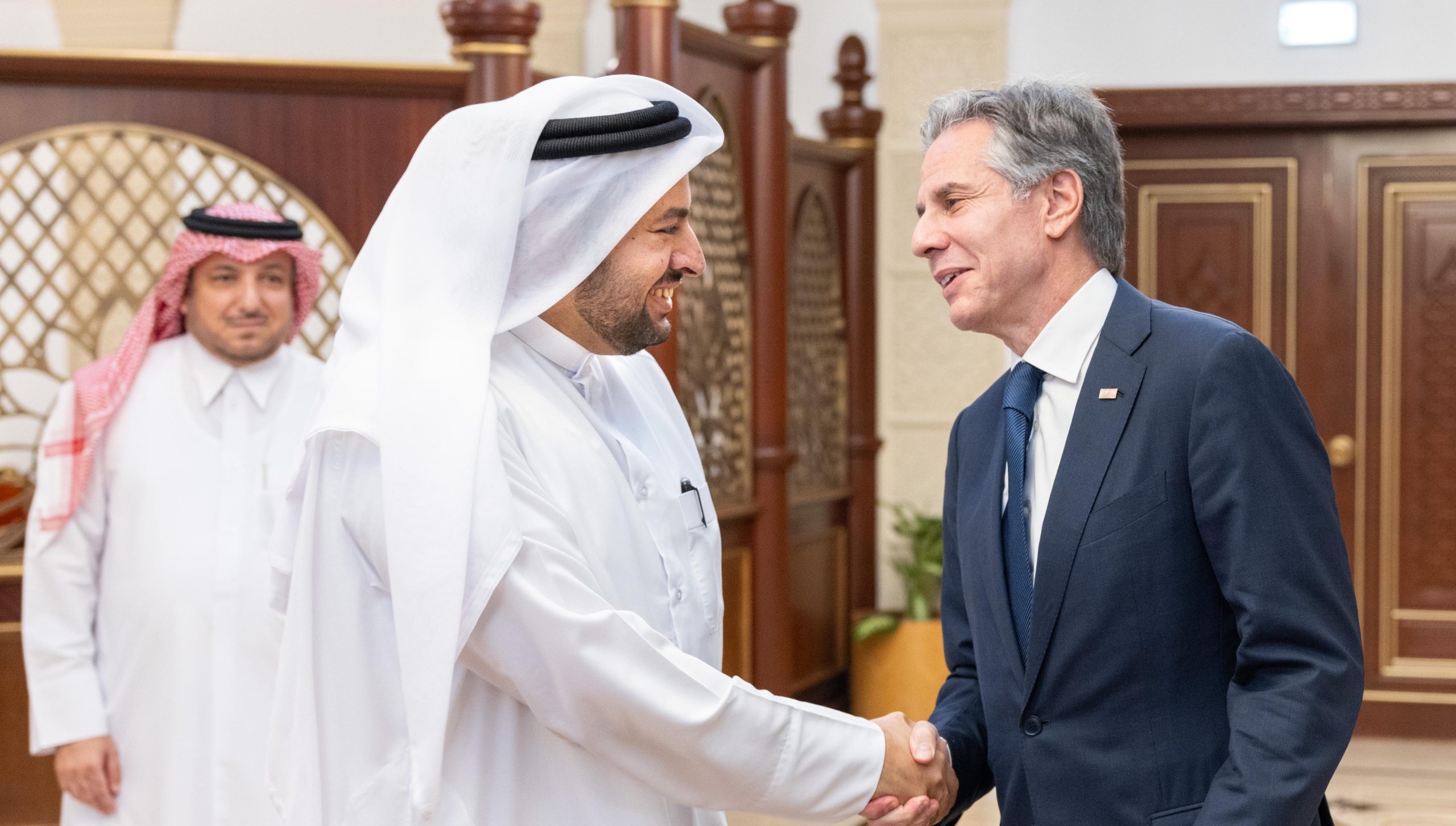Blinken also held a phone call with Qatar’s Amir Sheikh Tamim bin Hamad Al-Thani on Wednesday, where they discussed the latest developments in the Gaza Strip.
U.S. Secretary of State Antony Blinken held a phone call with Qatar’s Amir Sheikh Tamim bin Hamad Al-Thani on Wednesday to discuss “developments in the situation in the Gaza Strip” following his visit to Doha on Tuesday.
“During the call, the strategic relations between the two friendly countries were reviewed, in addition to developments in the situation in the Gaza Strip and the occupied Palestinian territories, and joint mediation efforts to end the war on the Strip,” the Amiri Diwan said in a readout on the call.
The phone call comes after Blinken’s visit to Qatar on Tuesday amid efforts to secure a captives release and a Gaza ceasefire deal following a stalemate in the talks between Israel and Hamas.
In Doha, Blinken met Qatar’s Minister of State at the Ministry of Foreign Affairs Mohammed Al Khulaifi, where both sides discussed the latest mediation efforts and the two countries’ “close strategic relations” on Tuesday.
“They stressed the need for calm and de-escalation in the region,” Qatar’s foreign ministry said in a statement.
Qatar’s Prime Minister and Minister of Foreign Affairs, Sheikh Mohammed bin Abdulrahman Al-Thani, was in Australia at the time of Blinken’s visit. Both officials held a phone call on the same day.
Similarly, Sheikh Mohammed and Blinken stressed the importance of reaching “an agreement that leads to a ceasefire in the Gaza Strip and the release of prisoners and detainees, and spares the region the consequences of regional escalation.”
“His Excellency [Sheikh Mohammed] also affirmed the State of Qatar’s commitment to its mediation role alongside partners in the Arab Republic of Egypt and the United States of America, and its continued endeavours and contacts aimed at ending the war and establishing peace in the region,” the Qatari foreign ministry said.
A readout on the call from the U.S. State Department said both sides “underscored that the bridging proposal presented by negotiators addresses the remaining gaps”.
Blinken embarked on a regional tour, his ninth trip since Israel waged the war in Gaza on October 7, 2023, where it killed at least 40,173 people.
The latest regional visit started on August 17 in Tel Aviv, followed by Cairo and wrapped up in Doha. It also came days after a round of talks took place in Doha between August 15-16.
In Israel, Blinken met President Isaac Herzog, Prime Minister Benjamin Netanyahu and Defence Minister Yoav Gallant. During his visit to Egypt, Blinken met President Abdel Fattah El-Sisi, Foreign Minister Badr Abdelatty, and intelligence chief Abbas Kamel.
‘Time is of the essence’
Speaking to the press before his departure from Doha, Blinken stressed the “need to get the ceasefire and hostage agreement over the finish line”.
“Time is of the essence because with every passing day the well-being and lives of the hostages are in jeopardy. Time is of the essence because every single day women, children, men in Gaza are suffering without access to adequate food, medicine, and at risk of being wounded or dying in fighting that they didn’t start and they cannot stop,” he said.
Blinken echoed Washington’s accusation over Hamas’s rejection of the bridging proposal, presented by the mediators a little over a week ago, despite Netanyahu’s insistence on continuing the war in the Gaza Strip.
However, in a statement on Tuesday, Hamas dismissed the American statements as “misleading” and a “greenlight” for Israel to commit more crimes in the Gaza Strip.
“These statements come within the framework of the complete American bias towards the Zionist occupation and the full partnership in the aggression and war of genocide against defenseless civilians in the Gaza Strip, and attempts to liquidate our national cause,” Hamas said.
Hamas said the bridging proposal constituted “a reversal against what the parties reached on July 2, based on Biden’s declaration on May 3, and Security Council Resolution 2735 on June 11”.
Some of the key sticking points in the negotiations include Israel’s insistence on occupying the Netzarim corridor, the Egypt-Gaza Rafah Crossing and the Philadelphi Corridor.
On Tuesday, Israeli news outlet Maariv quoted Netanyahu as saying that Israel will not withdraw from the Philadelphi and the Netzarim Corridor.
“Israel will not, under any circumstances, leave the Philadelphi Corridor and the Netzarim Axis despite the enormous pressure it is under to do so,” Netanyahu reportedly said during a meeting with families of Israeli captives.
When pressed by journalists on Netanyahu’s leaked remarks, Blinken said the U.S. “does not accept any long-term occupation of Gaza by Israel”.
“The agreement is very clear on the schedule and the locations of IDF withdrawals from Gaza, and Israel has agreed to that. So that’s as much as I know. That’s what I’m very clear about,” Blinken told the press in Doha.
He added: “I can’t speak to what he’s quoted as saying. I can just speak to what I heard from him directly yesterday when we spent three hours together, including, again, Israel’s endorsement of the bridging proposal.”
Israel’s war in Gaza has persisted for over 10 months, reducing the once vibrant coastal enclave to rubble while creating a dire humanitarian catastrophe. Gaza only witnessed a wee-long truce late last year that was mediated by Qatar and Egypt.
The deal led to the release of 109 Israeli captives out of 251 held by Hamas and 240 Palestinians from Israeli prisons.
Netanyahu has long cited his efforts to return the remaining captives to justify Israel’s onslaught in the Gaza Strip, which has led to the killing of some of the remaining captives. According to Reuters, a total of 109 captives are believed to be in Gaza, including a third of whom are believed to be dead.







